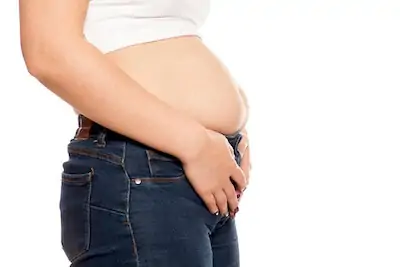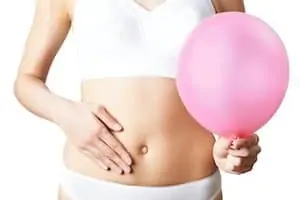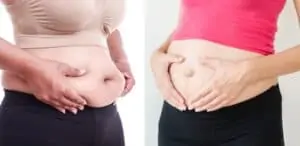One of the earliest pregnancy signs is bloating, but bloating is a common problem women face before, during, and after their period. Progesterone is present at all of these times and during pregnancy, so if you start to feel bloated, you might wonder – am I bloated or pregnant?
What is Bloating?
Chances are you’ve been bloated several times before; it’s far from abnormal. It is very common and has many causes.

When you’re bloated, you might feel fullness in your stomach, similar to how you’ll feel if you overeat food. It can also cause abdominal distention, which is why women confuse baby bump vs. bloating. In early pregnancy, you might look like you have a small pregnant belly, but in the early weeks, that’s all bloating.
Pregnancy is one common cause of bloating, but many pregnancy symptoms aren’t unique. Believe it or not, most early signs, such as nausea, breast tenderness, and bloating, are due to progesterone’s rise. This hormone increases at the end of your menstrual cycle, regardless of whether you’re pregnant – it’s part of your natural body cycle.
So, it’s easy to feel as if you’re pregnant when you’re not, and why do many women get confused? They feel a bit sick or run down, and suddenly they have sore breasts and tons of bloating. You find yourself staring at the mirror, wondering if it’s merely bloating or a baby bump starting.
If you’ve got a fat stomach already, read here if unsure about pregnancy or a fat belly.

What Causes Bloating?
Pregnancy is one cause of bloating, but what are the others? Read through these and see if they make sense and could cause discomfort.
Menstrual Cycle
Bloating is common before and during a woman’s period. Over half of all women will experience bloating during their cycle. It’s caused by the changing levels of estrogen and progesterone during your menstrual cycle.
Gassy Foods
Certain foods can increase bloating, typically ones that lead to gassiness — some top culprits include beans, cabbage, cauliflower, and Brussels sprouts.
Carbonated Drinks

Drinking carbonated drinks might taste good, but they lead to bloating. These drinks contain carbon dioxide gas, which is a cause of bloating, so put down the soda if you figure yourself bloated too often.
Ovarian Cysts
Women who have ovarian cysts have increased bouts of bloating. These cysts are fluid-filled sacs that grow on the ovaries. They can form at anytime but are most common during your menstrual cycle.
Fast Eating Habits
People who eat too fast swallow an abundance of air. Extra air in your stomach leads to gas and bloating. That also goes for chewing gum and drinking from a straw; both allow excess air to reach your stomach.
Bloating or Pregnant – How Do You Tell?
Pregnancy is a possibility if you’ve been sexually active in the past few weeks, but other factors can cause bloating. Those who track their menstrual cycles know if they missed their period or not, which is extremely helpful in determining if it’s a possibility.
The best way to figure it out is to take a home pregnancy test. Home pregnancy tests are typically accurate if taken on the day that your cycle is due to arrive and directions are followed correctly.
If you worry about these tests’ accuracy, you can ask your doctor to order a blood test.
Look For Other Early Pregnancy Signs
Another thing you can do is look for other early pregnancy signs, but remember, some of these come from progesterone and hormonal changes. Some symptoms that you might experience include:
Spotting
Many women experience spotting during early pregnancy. It’s often caused by implantation.
Fatigue
Within the first few weeks of pregnancy, you might develop fatigue due to the higher progesterone levels in your system, leading to sleepiness. Fatigue develops early and is common throughout your entire pregnancy.
Frequent Urination
You might associate frequent urination with later pregnancy, but it also starts in the first few weeks of pregnancy because of changing hormone levels. Bloating and frequent urination put pressure on your bladder, and varying hormone levels cause that.
Breast Changes
Between the 4-6th weeks of pregnancy, you might notice breast changes. The most common changes are tenderness and swelling caused by increasing estrogen levels.
Nausea

The most iconic sign of pregnancy is nausea or morning sickness. It can start as early as four weeks but often doesn’t show up until closer to the 6th week of pregnancy.
When Does Bloating Typically Happen in Early Pregnancy?
Bloating can happen anytime after implantation, occurring as early as 9-10 days post ovulation. However, for most women, it doesn’t happen at the onset of pregnancy. The progesterone takes several days or weeks to build up enough in your system to cause pregnancy symptoms.
In my experience, bloating started around 5th week. For the first week, I rarely have signs of pregnancy aside from positive tests. That doesn’t mean it couldn’t begin earlier for you; everyone is different.
Talk to Your Doctor
If you’re trying to figure out if you are bloated or pregnant, your first step should be to take a home pregnancy test. If that’s negative and the bloating continues, talk to your doctor. They can take a blood test to check hormone levels, and if you are confirmed not to be pregnant, you might want to make some dietary changes. Your doctor can help determine the problem at hand.
Hey, this is Linda. My biggest accomplishment in life is being a mother of four children. Their current ages range from almost ten years old down to 20 months old.
I’m passionate about writing parenting articles because I understand so well all of the problems and trials you face as a parent. From breastfeeding woes to budgeting problems and behavior problems, along with everything in between, chances are I’ve faced it over the last ten years. Read more about Linda here.






